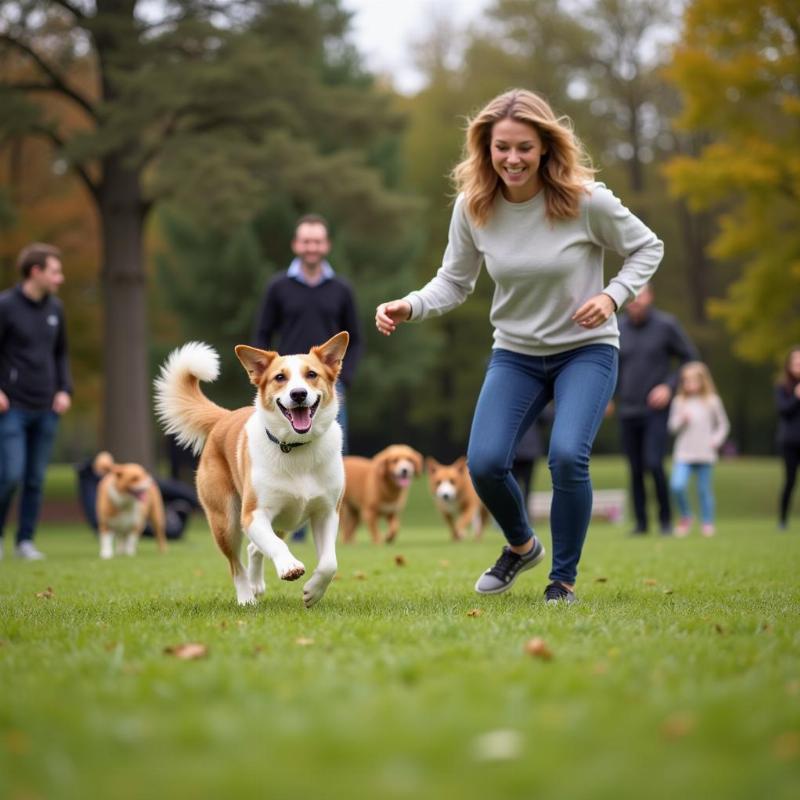Understanding why your furry friend might not be a fan of slobbery smooches can be puzzling. Many dog owners cherish those wet, enthusiastic dog “kisses,” but not all dogs express affection this way. If you’re wondering, “why doesn’t my dog give kisses,” there are several reasons, ranging from personality and past experiences to communication preferences and even underlying medical issues. Let’s delve into the possible explanations and discover how to better understand your canine companion’s unique way of showing love.
While some dogs shower their owners with affectionate licks, others might express their love through cuddling, tail wags, playful bows, or simply staying close by. It’s crucial to remember that every dog is an individual, with its own personality and preferences. Just like people, some dogs are naturally more affectionate than others.
Personality and Breed Differences Affecting Dog Kisses
Some dog breeds are known for being more outgoing and affectionate, while others are more reserved. Retrievers, for example, are often described as “velcro dogs” due to their tendency to stick close to their owners and shower them with affection, which might include kisses. In contrast, breeds like Chow Chows or Shiba Inus are typically more independent and might not be as inclined to offer licks.
Past Experiences and Trauma Can Influence Kissing Behavior
A dog’s past experiences can significantly influence their behavior. A dog rescued from a shelter or with a history of abuse or neglect might be hesitant to engage in close physical contact, including kissing. They may need time and patience to build trust and feel comfortable expressing affection.
Understanding Canine Communication: It’s Not Always About Kisses
Dogs communicate in various ways, and licking isn’t always a sign of affection. Sometimes, a lick can be a submissive gesture, a sign of anxiety, or even a way to gather information about their environment. Observe your dog’s overall body language – tail wags, relaxed posture, and soft eyes are generally good indicators of a happy and comfortable dog.
Medical Reasons Why a Dog Might Avoid Kissing
In some cases, a dog’s reluctance to kiss could be due to an underlying medical condition. Dental problems, such as gum disease or a sore tooth, can make licking painful. Skin irritations or allergies can also make a dog hesitant to have their face touched. If you notice any changes in your dog’s behavior, such as decreased appetite, lethargy, or excessive drooling, it’s essential to consult a veterinarian.
Building a Bond With Your Dog, Kisses or Not
Even if your dog isn’t a big kisser, there are many other ways to strengthen your bond. Regular playtime, training sessions, and simply spending quality time together can help you build a strong and loving relationship with your furry friend. Respect your dog’s boundaries and allow them to express affection in their own way.
 Bonding with a Dog Without Kisses
Bonding with a Dog Without Kisses
How to Encourage Kissing (If Your Dog is Open to It)
If you’d like to encourage your dog to give kisses, start by creating a positive association with the behavior. Offer gentle praise and a small treat when your dog licks your hand or face. Never force your dog to kiss you, as this could create negative associations and damage your bond.
Conclusion: Cherishing Your Dog’s Unique Way of Showing Love
Whether your dog is a prolific kisser or prefers to show affection through other means, the most important thing is to cherish the unique bond you share. Understanding your dog’s communication style and respecting their individual personality will strengthen your relationship and ensure a happy and fulfilling life together. Remember, “why doesn’t my dog give kisses” is often answered by recognizing their unique way of expressing love.
FAQ
- Why does my dog lick my face but not kiss me? Licking can be a sign of affection, but it can also have other meanings, such as submission or a way to gather information.
- Is it unsanitary to let my dog lick my face? While dog saliva contains some bacteria, the risk of transmission is generally low for healthy individuals. However, it’s essential to practice good hygiene and avoid letting your dog lick open wounds or near your mouth.
- How can I tell if my dog is showing affection? Look for other signs of affection, such as tail wags, relaxed posture, playful bows, and a desire to be close to you.
- What should I do if my dog suddenly stops giving kisses? If you notice any sudden changes in your dog’s behavior, it’s always best to consult a veterinarian to rule out any underlying medical conditions.
- Can I train my dog to give kisses? You can encourage the behavior with positive reinforcement, but never force your dog to kiss you.
- Do all dogs like to be kissed? No, not all dogs enjoy being kissed. Some dogs might tolerate it, while others might find it uncomfortable or even threatening.
- What are some other ways my dog might show affection? Dogs can show affection through cuddling, leaning against you, following you around, bringing you toys, and making eye contact.
Beautdogs.us: Your Trusted Source for All Things Dog
Beautdogs.us is your premier destination for comprehensive and engaging information on dog care, breeds, and lifestyle in the USA. We offer expert advice on everything from nutrition and training to health and grooming. Whether you’re a new dog owner or a seasoned pro, Beautdogs.us is your trusted resource for building a strong and loving bond with your canine companion. Contact us today to learn more! Email: [email protected], Phone: +1 501-555-7529.